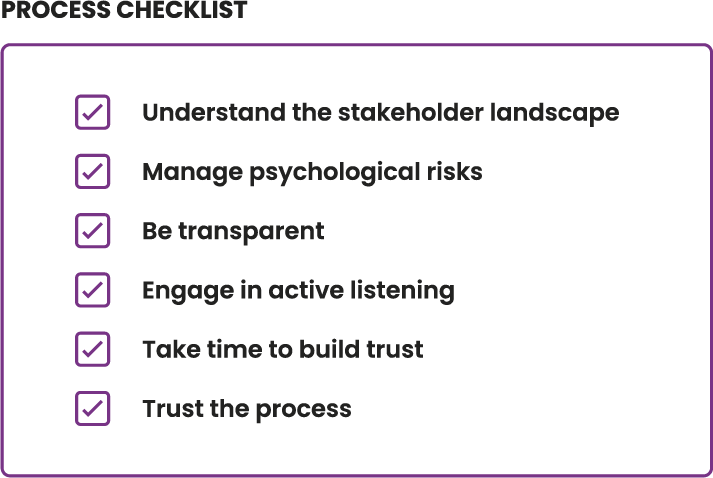Taking the time to earn trust.
How do you engage stakeholders in an environment where trust is scarce, tensions run high, and every conversation carries weight? That was the challenge Proximity faced in a recent series of stakeholder engagements conducted within a corrections environment. We have found certain fundamental principles hold true across all sensitive stakeholder engagements, whether around the boardroom table or inside a prison.
Understanding the stakeholder landscape
Effective stakeholder engagement begins long before the first conversation. Preparation, awareness, and careful relationship management are key to navigating complex environments.
Our evaluation team was commissioned to look at a workplace reform program for custodial officers in ACT Corrective Services, introduced because our client was working where several significant improvements needed to be made to support staff safety and wellbeing. The unique setting of corrections and understanding how this impacts workplace dynamics between staff in this environment was critical. We consulted with over 75 individuals as part of this engagement, and needed to be acutely aware of the unique workplace environment, as we engaged with both staff and detainees.
While adaptability during stakeholder engagement is critical, having a clear picture of the various stakeholders, their interests and the potential challenges this will impose, allows for more strategic and thoughtful engagement in any sensitive environment.
Managing psychological risks
Managing psychological risks in high-stress environments is vital for successful stakeholder engagement. In the field of corrections, we explored with stakeholders the intense stressors faced by staff and detainees. This required us to carefully navigate the risk of re-traumatisation and to handle these conversations with care.
It’s also essential to manage the mental health of those conducting these engagements. Implementing robust support systems, including mental health resources and regular debriefing sessions, helps maintain team resilience, while also enabling the continuation of meaningful, effective and empathetic engagement.
Transparency is vital
Setting expectations early on and having difficult conversations about hard truths is crucial. This means being upfront about the challenges and potential outcomes from the start, both with the client and stakeholders. Engagements such as these only work when clients genuinely want us to hold difficult conversations about their operating environment. This isn’t about pointing the finger or laying blame, it’s about commitment to understanding issues and improving, and the success of this engagement rested on ACT Corrective Services’ openness to hearing hard messages and ideas for solutions.
At the same time, to distil diverse opinions effectively and ethically, we need to ensure stakeholders understand that their views are heard, but also that there are multiple perspectives. This is about the importance of due process, hearing and reporting all views, but also being clear that final recommendations must reflect the full picture, not privileging a particular perspective over others. Inevitably, some stakeholders will find this disappointing, but being open from the start is key to making it fair.
Balancing stakeholder anonymity with transparency is also important, and if not managed carefully this can be difficult. However, by avoiding the use of direct quotes, and by speaking to representative stakeholders in each group, general attitudes and themes can be reported and key messages received by management, without individual anonymity being compromised. Striking the right balance here is critical to ensure all voices are heard, and the feedback provided is honest and constructive.
Engage in active listening
When exploring the pressure and stress faced by custodial officers and detainees, every view matters. Open engagement and active listening provide the best opportunity to hear from participants, regardless of individual reputations, alliances or criminal history.
Failing to put aside judgements and bias is a missed opportunity to gain important insights. In our case, active listening not only helped us understand diverse perspectives on the various topics we considered, but by committing to genuine dialogue, we were able to build trust and foster a more inclusive environment, ultimately extracting more valuable information from each interaction.
Building trust takes time
Unlocking honest conversations starts with building genuine connections. In sensitive environments, it can take time for everyone to open up about their challenges. Sometimes to build rapport, this can mean being flexible in your approach, such as meeting people where they are.
For this engagement, we spent several weeks in corrections facilities. This allowed us to be present and to demonstrate that we and our clients seriously cared about the engagement’s outcomes. In any complex stakeholder environment, taking time to create a foundation of trust and openness gives you the best chance at getting the most out of your engagement.
Trusting the process
Following any stakeholder engagement, it can be challenging to present findings in a fair and balanced way. This task only becomes more difficult when reporting on sensitive, highly contentious topics.
However, with the right preparation and proper application of engagement principles, the stakeholder engagement results need not be divisive. In our case, obtaining formal, independent ethics approval provided extra oversight of our approach, giving us additional certainty that we had thoroughly considered our methods and were prepared to tell truth to power.
Conducting sensitive stakeholder engagements involves having difficult conversations, building rapport, and sharing hard messages. By planning, executing and trusting the approach, delivering honest and impactful feedback can provide genuine insight into challenging issues for our clients.
Proximity has a team of experts with deep experience navigating complex stakeholder engagement projects, drawing out meaningful insights to deliver robust outcomes for our clients.








